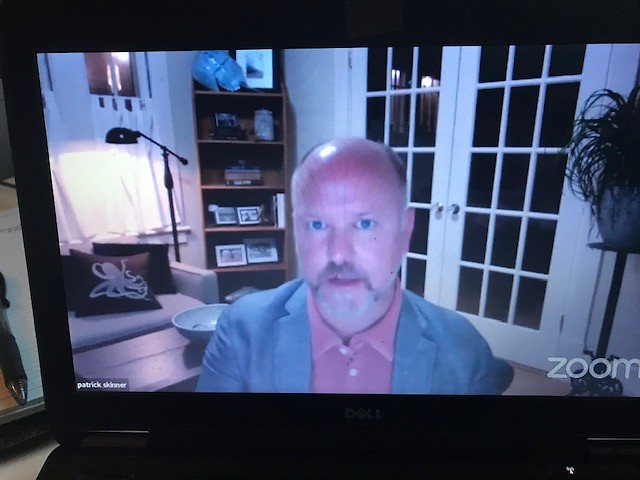Ex-CIA officer and current Savannah (Ga.) police officer Patrick Skinner spoke to a Grand Rapids-based World Affairs of Western Michigan audience on October 27, drawing the largest digital audience for the non-profit in the COVID era.
Skinner, who trained officers and handled assets in Iraq and Afghanistan for the CIA, came back to the U.S. to care for his ailing father and worked as a security analyst.
Four years ago, on a visit to Grand Rapids for the World Affairs Council, he gave a speech about ISIS and said later that he was convinced after that talk that he should do something about the policing issues he was noticing in the U.S. and become a police officer himself. He did so, becoming a 40-something rookie for his hometown police department in Savannah, Ga.
“I wanted to focus on the things I could change,” he said. “I was focusing on Iraq, Afghanistan and Syria—places I couldn't touch and hadn’t been to in a long time. But I couldn’t tell you what was happening down the street."
The absence of good local policing is what produces chaos, he said, and, in extreme situations, is the genesis for uprisings such as ISIS.
“What I am increasingly learning, and what I am encouraging other people to see, is that what I was doing overseas as part of the war on terror I now see us doing—and what we have been doing for a generation—in a ‘war on crime,’” said Skinner.
“I saw the consequences of a war on terror, where wars make monsters of us all, and then I realized we were doing a war on crime,” he added.
Skinner notes that the militarization of American police departments was particularly noticeable after 9/11, when the war of terror bled into policing strategies in our own country.
“I don’t mean that as a metaphor,” said Skinner. “I mean police dressed, equipped, and increasingly trained as warriors, as soldiers. And if you have soldiers, you have to have civilians, which is everyone who is not police.”
Skinner contends that this philosophy creates an “us and them” mindset, which is fundamentally wrong in his view. There should be no difference between the police and the community; they are all neighbors together, sharing the same community.
He noted that the overwhelming number of 911 calls that come into a police department—he says we’ve created a “911 nation” -- mean that officers are constantly in transit from one call to another. And because training has focused on rushing in and “solving the problem,” the discipline of stepping back to assess a situation has diminished.
For example, Skinner noticed early on that most 911 call reports contain a name and a phone number of the person who called. He makes sure he calls that individual before he arrives on the scene to understand what is happening at the moment and to have a person’s name he can mention upon arrival.
He believes that gives him time—time to think and assess the situation without bursting in and ordering people to do things (which, by law, they have to do, sometimes creating an escalation of the incident).
“I can slow this whole thing down,” he said, “which is an infinite lifetime.” He cites the tragedy of the Tamir Rice shooting in Cleveland as an example.
If he can make that call in advance, he can get out of his car, and the first thing said is, “Hi, I’m Officer Skinner. We just spoke.”
Not only does Skinner, an English major, want to change the “war” and “warrior” language, he also wants police to use the phrase “neighbor” more often, rather than “civilian” or even “citizen.” And he doesn’t care if he gets called “Mr. Rogers” in return.
“The warrior mentality is the result of training for war,” he said. “The killing of George Floyd was not a failure of training; it is the logical result of ‘us versus them’ training.”
He contends that the “neighbor mindset” does not cost anything and is a much better and safer way to work.
“I consider myself a very lucky person, and I want to leverage my luck and pass that on to my neighbors, many of whom haven’t had two lucky days in a row,” said Skinner.
In response to the “defunding police” rhetoric, he said that we first must reduce the staggering amount of 911 calls to the departments. Again referring to “911 nation,” he contended that civil efforts to reduce the reasons for many of these calls would be a major step. And that work should be on-going and proactive.
“Every city is one video away from a crisis,” he said. “When the demonstrations and rioting start, it is too late. We all matter, or none of us do.”
Note: Michael Van Denend is the excecutive director of the World Affairs Council of Western Michigan and hosted the q-and-a with Mr. Skinner.
The Rapidian, a program of the 501(c)3 nonprofit Community Media Center, relies on the community’s support to help cover the cost of training reporters and publishing content.
We need your help.
If each of our readers and content creators who values this community platform help support its creation and maintenance, The Rapidian can continue to educate and facilitate a conversation around issues for years to come.
Please support The Rapidian and make a contribution today.
